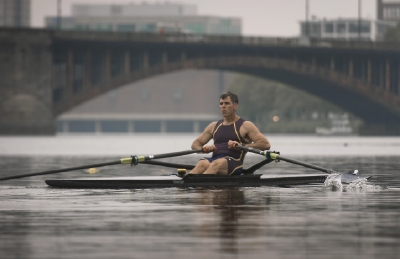Heart Procedure Keeps Former U.S. Rower on the Water
For most athletes, being diagnosed with a medical condition that might force them to give up the sport they love can be devastating. But for Mike Cataldo, a former member of the U.S. Rowing team, being diagnosed with a heart condition was just another challenge to overcome.
According to a report by Brigham and Women’s Hospital, Cataldo was preparing for the Head of the Charles Regatta in Cambridge when he noticed that he was getting abnormally high readings on his heart rate monitor. He figured that the heart rate monitor was defective, and threw it away, but a new one gave him the same high numbers.
Brigham and Women’s explains that Cataldo’s monitor was giving readings as high as 190 beats per minute, far above his typical training rate of 140 beats per minute. An EKG later revealed that his heart was beating at a rate of over 225 beats per minute, which led Brigham and Women’s doctors to diagnose Cataldo with atrial tachycardia, a type of cardiac arrhythmia. Atrial tachycardia is a heart rhythm disturbance that originates in the upper chambers of the heart and causes the heart to beat too fast.
Cardiac arrhythmias can be dangerous, particularly for athletes, because they can cause heart palpitations, lightheadedness, shortness of breath, fainting, and a range of other symptoms that can severely impact an individual’s quality of life, according to Brigham and Women’s. Sometimes arrhythmias can even lead to stroke or heart failure. Cataldo was advised to stop rowing, as he was in danger of losing consciousness during training on the water or, worse yet, during a race.
“I knew I needed to find a way to fix this problem, as I simply wasn’t willing to stop doing what I loved,” Cataldo said in the Brigham and Women’s report.
And he did. Cataldo went to see Dr. Laurence Epstein at Brigham and Women’s, and Epstein performed a robotic catheter ablation procedure that treated the specific area of Cataldo’s heart that was causing his heart rhythm issues. One month later, Brigham and Women’s reported that Cataldo was back on the water, competing in the men’s senior-master’s singles division in the Head of the Charles.
Now age 51, Cataldo is still rowing. He placed third in the Grand Master Single event of the Head of the Charles Regatta last year, and he also competes in races with his son.
“I feel great,” Cataldo told Brigham and Women’s. “I am looking forward to my next race.”



